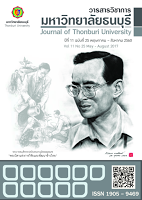แนวทางการจัดตั้งกลุ่มการเมืองและที่มาของนายกรัฐมนตรีที่ส่งผลต่อเสถียรภาพพรรคการเมือง: กรณีศึกษาร่างรัฐธรรมนูญแห่งราชอาณาจักรไทย พุทธศักราช 2558
Keywords:
กลุ่มการเมือง, ที่มาของนายกรัฐมนตรี เสถียรภาพพรรคการเมือง, ร่างรัฐธรรมนูญแห่งราชอาณาจักรไทย พุทธศักราช 2558, Political Group, Prime Minister Selection, Stability of Political Party, constitution Draft of the Kingdom of Thailand B.E.2558Abstract
บทคัดย่อ
งานวิจัยฉบับนี้มีวัตถุประสงค์ของการเพื่อศึกษาหาแนวทางการจัดตั้งกลุ่มการเมืองลงสมัครสมาชิกสภาผู้แทนราษฎรได้โดยไม่ต้องสังกัดพรรคการเมืองและการกำหนดที่มาของนายกรัฐมนตรีไม่จำเป็นต้องเป็นสมาชิกสภาผู้แทนตามร่างรัฐธรรมนูญ พ.ศ. 2558 ที่ส่งผลต่อเสถียรภาพของพรรคการเมืองและสถาบันการเมืองของไทย จากการศึกษาพบว่า 1) การกำหนดให้มีกลุ่มการเมืองลงสมัครสมาชิกสภาผู้แทนราษฎรได้โดยไม่ต้องสังกัดพรรคการเมือง อาจส่งผลกระทบต่อการพัฒนาระบบพรรคการเมืองไม่เป็นไปตามปรัชญาและหลักการของประชาธิปไตยในระบบรัฐสภา ทำให้ระบบพรรคการเมืองไม่มีเสถียรภาพ ขาดความเข้มแข็ง การเป็นตัวแทนพรรคการเมืองกับการเป็นตัวแทนของกลุ่มการเมืองไม่สอดคล้องสมดุลกันอาจเกิดกระบวนการรวมกลุ่มแลกเปลี่ยนผลประโยชน์ในทางการเมือง อีกทั้งกลุ่มการเมืองมีความรับผิดชอบทางการเมืองน้อยกว่าระบบพรรคการเมืองทำให้การทำงานของรัฐบาลไม่มีเสถียรภาพ ดังนั้น หากจะกำหนดให้กลุ่มการเมืองลงสมัครรับเลือกสมาชิกสภาผู้แทนราษฎรได้ ควรให้มีจดทะเบียนเป็นสมาชิกพรรคการเมือง 2) การกำหนดให้นายกรัฐมนตรีไม่จำเป็นต้องมาจากสมาชิกสภาผู้แทนราษฎรนั้น เป็นการกำหนดหลักการที่ไม่สอดคล้องกับหลักการประชาธิปไตยที่นายกรัฐมนตรีต้องมาจากการเลือกตั้งและยึดโยงกับประชาชน ที่มีกระบวนการตรวจสอบคัดกรองจากระบบพรรคการเมือง รัฐสภา และประชาชนเจ้าของอำนาจอธิปไตย อาจทำให้ระบบพรรคการเมืองไม่มีเสถียรภาพ ดังนั้น ในการร่างรัฐธรรมนูญสมควรอย่างยิ่งที่จะต้องกำหนดไว้ว่านายกรัฐมนตรีต้องเป็นสมาชิกสภาผู้แทนราษฎรเท่านั้น จึงจะ ทำให้ไม่เกิดความขัดแย้งในภาคประชาชนกับสถาบันการเมืองในประเด็นที่มาของนายกรัฐมนตรี
คำสำคัญ : กลุ่มการเมือง, ที่มาของนายกรัฐมนตรี เสถียรภาพพรรคการเมือง, ร่างรัฐธรรมนูญแห่งราชอาณาจักรไทย
พุทธศักราช 2558
Abstract
The objectives of this research were to find the guidelines of political group formation and Prime Minister selection that effected to the stability of political party: the case study of the Constitution Draft of the Kingdom of Thailand in 2015. The findings indicated that. 1) According to the principle of democracy, the formation of political group might be an obstacle to develop political party system by reducing political party authority (and performance). The obstacle that occurs from the unbalancing of authority between political partisans and political parties could become a cause of many problems such as giving advantage to interest group or pressure group, reducing stability of government, or even political party’s paying for independents. Meanwhile, Thai political condition always shapes the evolution of political parties that moves forward by law enforcement; not by its performance. 2) The second issue is a Prime Minister selection. The Prime Minister who is not required to be a member of the House of Representative will conflict with the principle of democracy. Democracy is a political system for choosing the government through free and fair voting by all citizens. The citizens will elect politicians (Political Parties’ members) to be the members of the House of Representative and then the members of the house of Representative will select a Prime Minister by voting. Normally, the party leader who has a majority of members in the House of Representative is voted as a Prime Minister It seems that all citizens will indirectly select their prime minster. Thus, the prime minister from citizen’s selection absolutely has right authority to from the government and govern the country.
Keywords: Political Group, Prime Minister Selection, Stability of Political Party, constitution Draft of the Kingdom of Thailand B.E.2558






